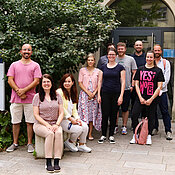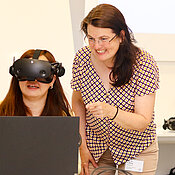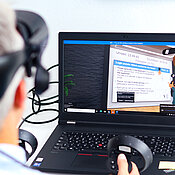Complex systems: Climate Change and the Effects on Health
Project goal: to prepare medical students for climate change and to enable collaborative and constructive learning, facilitated by digital systems
Project duration: abgeschlossen

Intention
Climate change is recognized as a global public health problem and will be an important element for the future workforce in all the disciplines of medicine and healthcare. Doctors will play a crucial role in the mitigation of climate change and adaptation of the healthcare system to prepare for emergent healthcare treatment methods.
One of the most important concerns nowadays is to prepare students for clinical practice in this critical environment. This project implements knowledge and training into the curricula of medical degree courses. It combines the emerging topic of climate change and its effects on health with newly developed didactic concepts. Teaching is performed as a blended learning concept with asynchronous material on WueCampus and subsequent online meetings. An introductory lesson will set the basis. In further seminars, an online climate simulation tool to assist in understanding climate goals will be used to simulate changes in energy, land use, consumption, agriculture, and other policies. Finally, students will deal with patient cases as fictitious scenarios related to a local increase in temperatures, as an indicator of climate change. They will explore and solve these cases using the methods of problem-based learning.
Background information, complex simulations, and patient cases will be used as vehicles to promote student learning. There are different domains of professionalism, which are closely related to each other and will serve as learning delivery for students: Understanding the existing and potential health impacts of climate change, identifying climate-related health issues, being aware of characteristics that may make certain individuals especially vulnerable to climate change, e.g. heatwaves and managing climate-sensitive illnesses.
Problem solving based on patient cases
The teaching project will also address problem-based learning (PBL) as a method to enhance students’ active involvement in learning. Students work in small groups and analyze an uncertain situation dealing with patients suffering from climate change. They have to identify the associated symptoms. They then define learning objectives to understand the conditions of the underlying diseases, research the problem with the aid of suitable sources of information, and finally present to each other the results to close the gap in knowledge. Apart from the subject-related learning objectives, problem-based learning supports students to promote self-learning, develop transferable skills, and improve teamwork abilities, as well as to encourage intrinsic rewards.
The teaching project is realized in a purely digital format as a series of online seminars on the videoconferencing and interaction platform Zoom. Classroom settings and conferences will be performed in 2D and tools such as online whiteboards and the interactive En-ROADS simulator will enhance student involvement. In a second step, a fully immersive classroom will be implemented with virtual reality (VR) technology.
The En-ROADS-Simulator will be employed during the interactive online seminars. It is a free and web-based simulation tool for understanding climate goals through changes in taxes, subsidies, economic growth, energy efficiency, technological innovation, carbon pricing, fuel mix, and other factors that impact global carbon emissions and temperatures. The simulator is designed to be used interactively by small groups. It stimulates conversations and discussions on climate change with a global perspective and how to deduce mitigation efforts. By investigating different scenarios, students gain a deeper understanding of climate change and how it is effected by the complex interplay of different measures from the sectors. Through discussions in groups and a negotiation process, they come up with solutions to tackle the rising temperature with the best outcome. The simulation tool will help future doctors and medical staff to understand the necessity of dealing with the implications of climate change.
Online Whiteboards enable social interaction between students during the seminars. In particular, the platform Miro will serve as tool for visual collaboration, enable team work, and thus promote motivational and active learning. Student groups are provided with tasks, then discuss and record their ideas and suggestions in writing. Digital collaboration will be assisted by brainstorming sessions using sticky notes, which are then further consolidated as comments and statements.
ViLearn comprises an immersive classroom for teachers and learners to communicate and interact with each other in a virtual learning environment. The VR technology allows students to learn and work together in a highly authentic setting mimicking a real classroom with social interactions. The immersive classroom is equipped with the established features to facilitate all activities known from face to face teaching in higher education: the lecturer presents slides, asks questions, and communicates with the learners. Students work on laptops, take notes, and search the Internet. To collaborate in small groups, they can enter different rooms.
Im interdisziplinären Projekt "Virtuelle Lernräume für klimasensible Gesundheitsversorgung: Innovative Ansätze zur Ausbildung von Medizinstudierenden" der Medizinischen Fakultät werden die Auswirkungen des Klimawandels auf die Gesundheit vulnerabler Personen vermittelt. Ziel ist es, das Bewusstsein und Verständnis für die Besonderheiten des Klimawandels auf erkrankte Personen zu stärken.
Die Studierenden erweitern ihr Wissen durch interaktive Modelle und digitalen Werkzeugen/Methoden und erwerben praktische Fähigkeiten, um den Herausforderungen des Klimawandels im Gesundheitssystem zu begegnen. Mit der Integration des immersiven Klassenraums (ViLearn – RealityStack) und Exkursionen in virtuelle Welten ermöglichen wir eine aktive Teilnahme und vertiefen die Kenntnisse der Studierenden durch praktische Anwendungen im Rahmen erfahrungsbasierter Lehre.
Interaktive 3D-Modelle einer umweltfreundlichen Landschaft bieten eine innovative Lernerfahrung. Die Teilnehmenden nutzen virtuelle Realität, um ein tieferes Verständnis für Umweltschutz und nachhaltige, urbane Lebensräume zu entwickeln. Bei der virtuellen Grün-Garten-Tour erkunden sie verschiedene grüne Umgebungen mit Gärten und Häusern. Interaktive 3D-Tools und virtuelle Quizze befassen sich mit Themen wie abkühlende Effekte, CO₂-Reduzierung und Energieeinsparung.
Während der Tour reflektieren die Teilnehmenden ihre Eindrücke und diskutieren, wie die gewonnenen Erkenntnisse in eine nachhaltigere Gesundheitsführung und Krankenversorgung übertragen werden können.
The Faculty of Medicine, University of Würzburg; Chair of Human-Computer Interaction (HCI) of the University of Würzburg









